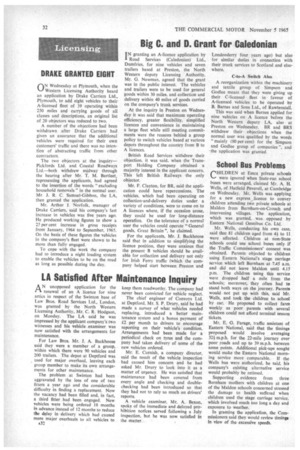Big C. and D. Grant for Caledonian
Page 34

If you've noticed an error in this article please click here to report it so we can fix it.
I N granting an A-licence application by Road Services (Caledonian) Ltd., Dumfries. for nine vehicles and seven trailers based at Preston, the North Western deputy Licensing Authority, Mr. G. Newman, agreed that the grant was in the public interest. The vehicles and trailers were to be used for general goods within 30 miles, and collection and delivery within 40 miles of goods carried on the company's trunk services.
At the inquiry in Preston on Wednesday it was said that maximum operating efficiency, greater flexibility, simplified licences and convenience in maintaining a large fleet while still meeting commitments were the reasons behind a group policy to switch vehicles based at various depots throughout the country from B to A licences.
British Road Services withdrew their objection, it was said. when the Transport Holding Company obtained a majority interest in the applicant concern. This left British Railways the only objector.
Mr. F. Clayton, for BR, said the application could have repercussions. The vehicles, which had been operating on collection-and-delivery duties under a variety of conditions, were to come on to A licences where, if the occasion arose, they could be used for long-distance operation. On the tolerance of a normal user the vehicles could operate "General goods, Great Britain", he claimed_
For the applicants, Mr. 1 Backhouse said that in addition to simplifying the licence position, they were anxious that the present B vehicles should be available for collection and delivery not only for Irish Ferry traffic (which the company helped start between Preston and
Londonderry four years ago) but also for similar duties in connection with their trunk services to Scotland and elsewhere.
C-to-A Switch Also A reorganization within the machinery and textile group of Simpson and Godlee meant that they were giving up their C-licensed fleet in favour of A-licensed vehicles to be operated by B. Barnes and Sons Ltd., of Rawtenstall.
This was said when Barnes applied for nine vehicles on A licence before the North Western deputy LA, also at Preston on Wednesday. BR and BRS withdrew their objections when the normal user was qualified by the words "mainly (80 per cent) for the Simpson and Godlee group of companies", and the application was granted.
School Bus Problems
rH1LDREN at Essex private schools were ignored when State-run school buses were arranged, claimed Mr. A. H. Wells, of Hatfield Peverell, at Cambridge on Wednesday. Mr. Wells was applying for a new express_ licence to convey children attending two private schools at Maldon from Burnham-on-Crouch and intervening villages. The application, which was granted, was opposed by Eastern National Omnibus Co. Ltd.
Mr. Wells, conducting his own case, said that 81 children aged from 4+ to 11 were affected. Children at non-State schools could use school buses only if the Traffic Commissioners' consent was obtained. Parents objected to children using Eastern National's stage carriage service which left Burnham at 745 a.m. and did not leave Maldon until 4.15 p.m. The children using this service were dropped half a mile from the schools; moreover, they often had to stand both ways on the journey. Parents would not put up with this, said Mr. Wells, and took the children to school by car. He proposed to collect fares weekly as poor parents with several children could not afford terminal season tickets.
Mr. E. G. Farage, traffic assistant of Eastern National, said that the timings proposed would involve averaging 32+ m.p.h. for the 22-mile journey over poor roads and up to 39 m.p.h. between some points. Additional pick-ups sought would make the Eastern National morning service more comparable. If the Wells bus were authorized, he said, his company's existing alternative service would probably be retimed.
Supporting evidence from three Burnham mothers with children at one of the Maldon schools concerned stressed the damage to health suffered when children used the stage carriage service, which involved much too long a day and exposure to weather.
In granting the application, the Commissioners said they would review timings In view of the excessive speeds.




















































































































